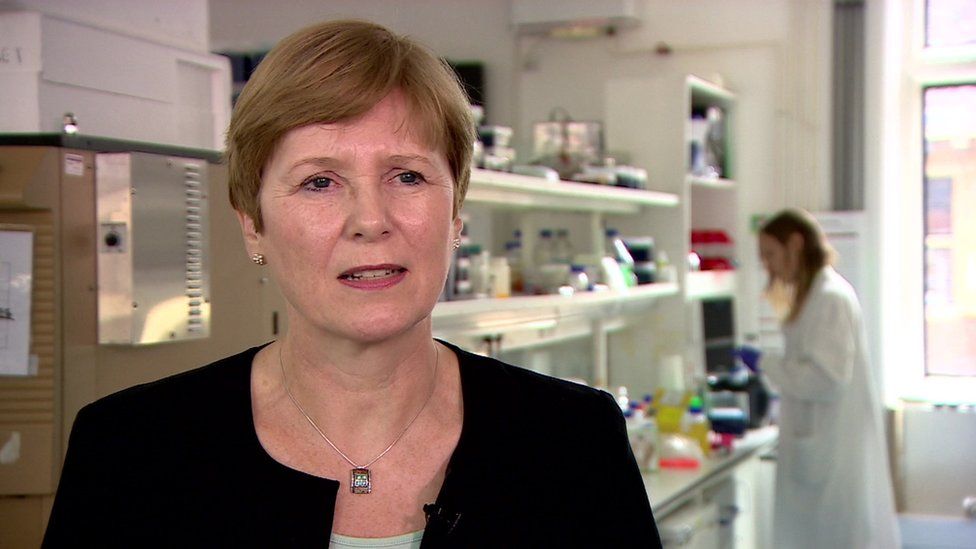UK scientists speak about Brexit pain
- Published

Just weeks after the UK voted to leave the European Union, researchers are losing grants.
BBC News has spoken to several research groups and small businesses who say they will soon have to scale down operations and lay off staff.
Seven national academies have called on the government to ensure that research is protected in Brexit negotiations; the President of the Royal Society has told the BBC that the future prosperity of the UK is at stake.
British universities, in collaboration with small businesses, receive £850m in research grants each year from the European Union.
Since the vote to leave the European Union there have been reports that British applicants for grants are already losing out.
'Frozen out'
Dr Nick Wright is one of the UK's brightest young astronomers at Keele University in Staffordshire. A long-standing collaborator recently told him that he was applying for a travel and accommodation grant, which would enable astronomers from research groups across Europe to work together on similar research projects at each other's universities.
But Dr Wright was told that there were concerns from others involved in the application that a UK institution's involvement in the project would harm its chances - so Dr Wright and his group were asked not to be involved.
He told BBC News that Brexit was already beginning to hurt.
"It made me think we were missing out; that potentially they would go ahead without us or even worse they would find our expertise elsewhere in Europe and we would be frozen out of this kind of research in the future," Dr Wright said.
"We are going to start getting frozen out of big projects. Researchers in Europe are looking elsewhere to collaborate and that might mean we are not at the table when big discoveries are made."
Archer Technicoat is a small hi-tech company in High Wycombe, which develops bespoke coatings to toughen components. On the day BBC News visited the company, engineers there were testing a new coating for rocket thrusters for the European Space Agency.
This coating would allow the thrusters to burn at much higher temperatures and hence use more explosive rocket fuel, reducing the cost of future Mars missions.
Since it was founded, the firm has received EU funds from the Horizon 2020 research programme. That money has helped the firm develop its products, stay at the cutting edge of research and most importantly to develop contacts that have helped the company win orders.
I asked the firm's managing director John Yeatman what had happened to its European funding as a result of the referendum.UK scientists speak about Brexit pain
"The short answer is that it's stopped," he said.
"We have been involved in Horizon 2020 programmes for 30 years and the interest from European partners for involving us in their projects has basically dried up."
Prof Alison Smith leads a project at Cambridge University to harness the power of algae to develop new products, such as medicines and expensive chemical ingredients, more efficiently.
Her group leads the world in this field and Prof Smith, as the coordinator of a research collaboration worth millions of euros, has helped the team win various research grants.
This year her collaborators suggested that she take a back seat.
"We have decided that I will not be the coordinator; instead my colleague in Paris will do that," she told BBC News.
"That is because getting these grants is very competitive and we don't want to jeopardise our chances by having a UK person as a coordinator."
Image problem
Christopher Bovey was planning to set up a testing company, Herba Invest, in Totnes in Devon to help manufacturers of herbal products gain European Union regulatory approval.
"I'm flying to Spain to help start up the new Spanish company, since, thanks to Brexit, it is not viable to do this in the UK," he said. "The irony is that Brexit voters have forced me to fly to Spain to create jobs for Spanish people."
Beyond these practicalities and uncertainties, there are grave fears for the reputation of the UK as a place for doing research.
Prof Ilaria Bellantuono of Sheffield University is part way through a funding application process. She said: "If we pass to stage two of our grant application, our German partner said that it was likely the UK participants would not be included in the full application… because there is apprehension regarding reviewers judging our participation as risky."
Prof Rich Dawson, an engineer from Newcastle University, told a similar tale. "A project being led by Coventry University that was due for submission this August, with us as partners, is no longer going ahead because everyone fears it will be wasted effort," he said.
Dr Pietro Cicuta, a physicist at the University of Cambridge, said the UK's image was already tarnished.
"To state things… simply, in the words of a young PhD student in our department: the UK has gone from being cool to uncool in a day."
Follow Pallab on Twitter
- Published19 July 2016
- Published30 June 2016
- Published2 July 2016